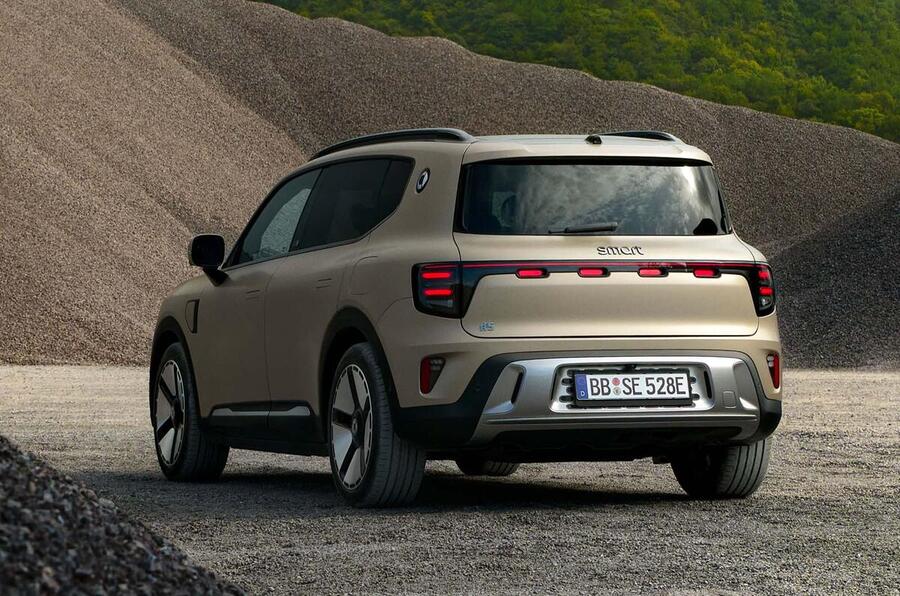This post was originally published on Autocar
Decision to add PHEV tech to #5 is a response to market trends in China
New SUV to go hybrid in selected markets as Smart steps back from all-electric line-up
The new Smart #5 SUV is set to be sold with a plug-in hybrid drivetrain alongside previously revealed pure-electric variants in response to growing concerns around sales in some global markets.
The move, confirmed by Chinese-based Smart officials after photos of test mules were posted on social media, represents a major step-change for the Geely- and Mercedes-Benz-owned company, which previously committed to exclusively selling new-generation Smart models with electric power.
Commenting on the move, Smart’s European operations spokesperson told Autocar: “We see individual mobility powered by combustion engines and, in particular, with hybrid drives as a transitional technology towards purely electric driving. It is important to respond to the increasingly diverse demands and desires of the customers. Smart cannot exclude any technological solution for the future at the current point of time”.
The decision to begin offering the largest Smart model to date with a plug-in hybrid drivetrain is also likely to be a reaction to changing sales dynamics in Smart’s largest market, China, where plug-in hybrids and range-extenders have experienced strong sales recently.
Technical details of the plug-in hybrid version of the #5 remain under wraps, though it is thought to use a variant of the Thor system already fitted to other recent new Geely models, including the Galaxy 7 EM-i.
It combines a turbocharged 1.5-litre four-cylinder petrol engine and electronic dual-hybrid transmission (E-DHT) developing 110bhp in combination with a 215bhp electric motor.

In the Galaxy 7 EM-i, the Thor system comes with the choice of either an 8.5kWh or 19.1kWh lithium-iron-phosphate battery providing respective ranges of 34 miles and 75 miles on the Chinese Light Duty Vehicle Test Cycle (CLTC) procedure.
With average fuel consumption of 74.3mpg and a maximum 1724kg kerb weight in combination with the 19.1kWh battery, the Geely’s overall range is put at 883 miles.
By comparison, the electric versions of the #5 offer between 335bhp in single-motor and 416bhp in dual-motor guises – the former running a 400V and latter an 800V electric architecture. They are coupled with 76kW lithium-iron-phosphate and 100kWh lithium ion batteries with ranges of between 354 and 460 miles on the Worldwide Harmonised Light Vehicle Test Procedure (WLTP).
A similar plug-in hybrid drivetrain is also offered in the Zeekr 7X – a model already confirmed for sale in selected European markets in 2025.
While details of Smart’s plans for sales of a plug-in hybrid #5 in the UK have yet to be revealed, the indications are that it is being readied for launch in 2026. Electric versions of the new SUV model are set to go on sale in European markets, including the UK, in mid-2025.
Geely’s and Mercedes-Benz’s decision to step back from original plans to make Smart models purely electric comes after Geely’s Lotus brand announced it would also abandon its strategy of electric-only models.
Speaking at the Guangzhou motor show last November, Lotus CEO Feng Qingfeng said the British-based car maker would introduce models featuring so-called ‘Super Hybrid’ technology with turbocharged combustion engines, electric motors and ultra-fast charging to extend their overall range to up to 680 miles.
Lotus has yet to divulge which models are planned to receive petrol-electric power, though it is anticipated that both the Eletre SUV and Emeya saloon will receive hybrid drivetrains as part of plans to broaden their reach in key markets such as China, the US and the UK.
Another Lotus model expected to feature hybrid power is the company’s upcoming Porsche Macan-rivalling SUV, currently under development and due to be previewed in 2025.
“At Lotus, we have always chosen the best power technology available, whether it’s pure gasoline, pure electric, hybrid or range-extended [EV],” Feng told the Wall Street Journal in an interview.
Feng’s specific reference to range-extended technology suggests Lotus could be looking beyond conventional hybrids in favour of a new range-extender set-up in which the combustion engine acts purely as a generator to produce electricity, rather than providing direct drive to the wheels.
Meanwhile, Geely-owned brand Zeekr has confirmed it plans to launch three plug-in hybrid models in 2025, including a new range-topping SUV model, in a move that will see it diversify from its original plans of offering pure-electric models only.

